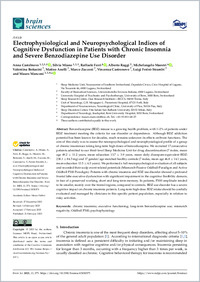Electrophysiological and neuropsychological indices of cognitive dysfunction in patients with chronic insomnia and severe benzodiazepine use disorder
- Castelnovo, Anna ORCID Sleep Medicine Unit, Neurocenter of Southern Switzerland, Civic Hospital of Lugano, Switzerland - Faculty of Biomedical Sciences, Università della Svizzera italiana, Switzerland - University Hospital of Psychiatry and Psychotherapy, University of Bern, Switzerland
- Miano, Silvia ORCID Sleep Medicine Unit, Neurocenter of Southern Switzerland, Civic Hospital of Lugano, Switzerland - Faculty of Biomedical Sciences, Università della Svizzera italiana, Switzerland
- Ferri, Raffaele Sleep Research Centre, Oasi Research Institute—IRCCS, Troina, Italy
- Raggi, Alberto Unit of Neurology, G.B. Morgagni–L. Pierantoni Hospital, Forlì, Italy
- Maestri, Michelangelo Department of Neurosciences, Neurological Clinic, University of Pisa, Italy
- Bottasini, Valentina Sleep Disorders Center, Vita-Salute San Raffaele University, Milan, Italy
- Anelli, Matteo Sleep Disorders Center, Vita-Salute San Raffaele University, Milan, Italy
- Zucconi, Marco Sleep Disorders Center, Vita-Salute San Raffaele University, Milan, Italy
- Castronovo, Vincenza Sleep Disorders Center, Vita-Salute San Raffaele University, Milan, Italy
- Ferini-Strambi, Luigi Sleep Disorders Center, Vita-Salute San Raffaele University, Milan, Italy
- Manconi, Mauro ORCID Sleep Medicine Unit, Neurocenter of Southern Switzerland, Civic Hospital of Lugano, Switzerland - Faculty of Biomedical Sciences, Università della Svizzera italiana, Switzerland - Department of Neurology, Inselspital, Bern University Hospital, Switzerland
- 2023
Published in:
- Brain Sciences. - 2023, vol. 13, no. 3, p. 375
Chronic insomnia
Executive functioning
Long-term benzodiazepine use
Mismatch negativity
Oddball P300
Psychophysiology
English
Benzodiazepine (BDZ) misuse is a growing health problem, with 1–2% of patients under BDZ treatment meeting the criteria for use disorder or dependence. Although BDZ addiction potential has been known for decades, much remains unknown its effects on brain functions. The aim of this study was to assess the neuropsychological and neurophysiological profile of a group of chronic insomniacs taking long-term high doses of benzodiazepine. We recruited 17 consecutive patients admitted to our third-level Sleep Medicine Unit for drug discontinuation (7 males, mean age 49.2 ± 11.2 years, mean education 13.7 ± 3.9 years, mean daily diazepam-equivalent BDZ: 238.1 ± 84.5 mg) and 17 gender/age-matched healthy controls (7 males, mean age 46.8 ± 14.1 years, mean education 13.5 ± 4.5 years). We performed a full neuropsychological evaluation of all subjects and recorded their scalp event-related potentials (Mismatch-Passive Oddball-Paradigm and Active Oddball P300 Paradigm). Patients with chronic insomnia and BDZ use disorder showed a profound frontal lobe executive dysfunction with significant impairment in the cognitive flexibility domain, in face of a preserved working, short and long-term memory. In patients, P300 amplitude tended to be smaller, mainly over the frontal regions, compared to controls. BDZ use disorder has a severe cognitive impact on chronic insomnia patients. Long-term high-dose BDZ intake should be carefully evaluated and managed by clinicians in this specific patient population, especially in relation to risky activities.
- Collections
- Language
-
- English
- Classification
- Medicine
- License
- Open access status
- gold
- Identifiers
-
- DOI 10.3390/brainsci13030375
- ARK ark:/12658/srd1332015
- Persistent URL
- https://n2t.net/ark:/12658/srd1332015
Statistics
Document views: 84
File downloads:
- Manconi_2023_MDPI_brainsci_Electrophysiological and Neuropsychological Indices: 30
